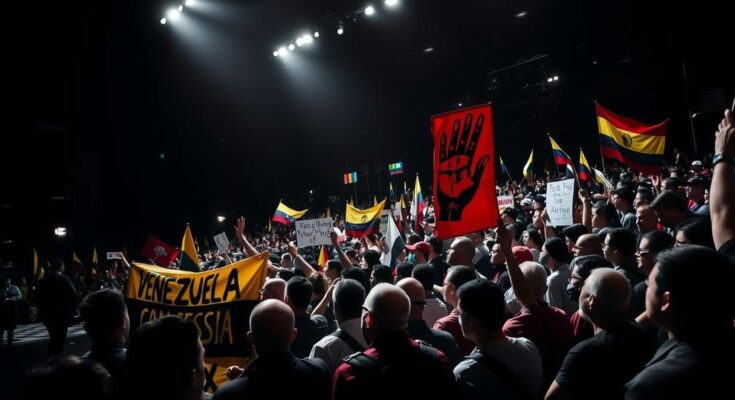Venezuela hosted the Antifascist International For a New World promotional committee meeting, attended by over 400 international delegates. The event aimed to combat fascism through structured discussions and working groups, led by representatives from various sectors. President Maduro announced the establishment of a World Antifascist School during the congress, emphasizing international cooperation and youth involvement in countering fascist ideologies.
Last Wednesday in Caracas, Venezuela, a significant event transpired as over 400 international delegates convened for the inaugural meeting of the Antifascist International For a New World promotional committee. This assembly took place at the Simón Bolívar Park Convention Center and was led by Venezuelan Foreign Minister Yván Gil alongside Rander Peña, a representative of the United Socialist Party of Venezuela (PSUV). The committee’s establishment is a direct outcome of the World Congress against Fascism held in September, aimed at implementing the action plan devised during that congress.
During the two-day event, delegates collaborated across seven specialized working groups, each devising strategies to effectively combat fascism. Notable leaders of these groups include Grecia Colmenares for youth mobilization, Deputy Gustavo Villapol focusing on communication and counter-narratives in social media, and Pedro Infante examining the role of People’s Power in addressing fascism. Additionally, discussions on human rights were led by Deputy Blanca Eekhout, while Clara Vidal represented Indigenous Peoples, and Diva Guzmán focused on women’s roles in the anti-fascist movement. Francisco Torrealba led the group advocating for the defense of labor rights.
In a related announcement, President Nicolás Maduro revealed plans to establish the Antonio José de Sucre National School of Venezuelan Youth as a hub for the World Antifascist School. This initiative arose from the recent World Congress of Antifascist Youth and Students, where over 1,000 participants from 72 nations gathered to address various forms of fascism and neo-fascism. Maduro emphasized the importance of integrating diverse educational approaches from countries like China, India, and Mexico.
During the congress, Maduro asserted, “We committed ourselves to fight against all forms of oppression, recognizing that fascism and Zionism arise from the same source of hatred.” He articulated how modern fascism exploits societal disenfranchisement, urging for the cultivation of inclusive discourse. Maduro also underscored the need to oppose cyberfascism while defending human rights and national sovereignty.
At the conclusion of the congress, Maduro remarked on the necessity of fostering community resilience against oppressive ideologies. He proclaimed the Venezuelan commitment to contribute to a multipolar world, stating that it is critical to establish innovative strategies for resistance, thereby transforming societal fate into collective consciousness. This gathering exemplifies a significant advancement in Venezuela’s effort to unify global anti-fascist movements and encapsulates their strategic vision for future engagements.
The recent developments in Venezuela highlight the nation’s ongoing commitment to combat fascism, a priority for its leadership that has been underscored by the establishment of the Antifascist International For a New World promotional committee. This aligns with broader global concerns regarding rising extremist ideologies that threaten democratic values and human rights. The initiative mirrors similar movements around the world aiming to mobilize diverse groups against the pervasive threat of fascism. The emphasis on youth engagement and international collaboration illustrates Venezuela’s strategy to counter narratives that promote division and exclusion.
In summary, Venezuela’s recent Antifascist Congress marks a pivotal moment in the international fight against fascism, underscoring a strong commitment to unity and proactive engagement among young individuals and various societal groups. The creation of the World Antifascist School reflects an innovative approach to education and resistance, seeking to empower future generations. President Maduro’s speeches emphasize the interconnectedness of global struggles against oppression, reaffirming Venezuela’s role in leading a significant movement that promotes peace, justice, and solidarity worldwide.
Original Source: www.dailynewsegypt.com




